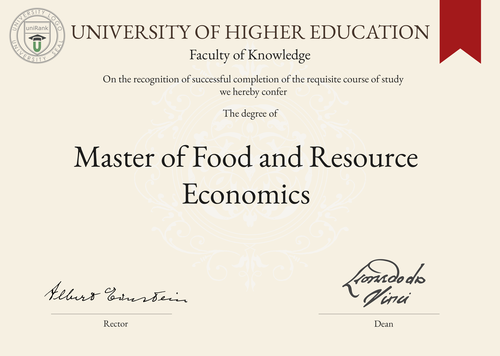
Master of Food and Resource Economics (M.F.R.E.)
Guide to Master of Food and Resource Economics Program/Course/Degree
Master of Food and Resource Economics (M.F.R.E.)

Degree Name:
Master of Food and Resource Economics
Degree Abbreviation:
M.F.R.E.
Duration Range:
1-2 years
Tuition Range (US, UK, AUS, NZ):
$10,000-$50,000
Overview:
The Master of Food and Resource Economics degree is a graduate-level program that focuses on the economic aspects of food production, distribution and consumption. This degree program is designed to provide students with the skills and knowledge necessary to analyze and solve complex economic problems related to food and resource management.
Curriculum Overview by Year:
- Year 1:
- Microeconomic Theory
- Macroeconomic Theory
- Statistics for Economics
- Food and Resource Economics
- Agricultural Economics
- Year 2:
- Environmental Economics
- International Trade
- Food Policy
- Resource Management
- Research Methods in Economics
Key Components:
The key components of the Master of Food and Resource Economics degree include a strong foundation in microeconomic and macroeconomic theory, as well as specialized coursework in food and resource economics, agricultural economics, environmental economics and international trade. Students will also gain practical experience through research projects and internships.
Career Prospects:
Graduates of the Master of Food and Resource Economics degree program can pursue a variety of careers in the public and private sectors. Some common career paths include agricultural economist, food policy analyst, environmental economist and resource manager.
Salary Expectations:
The salary expectations for graduates of the Master of Food and Resource Economics degree program vary depending on the specific career path and location. According to Payscale, the average salary for an agricultural economist is $71,000 per year, while the average salary for an environmental economist is $85,000 per year.
For a more accurate understanding of salary expectations, you can utilize the Job Sites Search Engine, from our sister site jobRank, which searches over 4,600 job sites worldwide. Make sure to specify not only the job title but also the country you are interested in.Conclusions:
It is important to note that the duration, tuition fees, curriculum, key components, career prospects and salary expectations of the Master of Food and Resource Economics degree can vary depending on the country and university where the degree is pursued. Visitors can search for where this specific degree is offered anywhere in the world through the uniRank World Universities Search Engine.
World Universities Search Engine
search for Master of Food and Resource Economics (M.F.R.E.) and add the Location (country, state etc.) or specific University you are interested in studying at.
Query examples:
- Master of Food and Resource Economics (M.F.R.E.) United States
- Master of Food and Resource Economics (M.F.R.E.) United Kingdom online
- Master of Food and Resource Economics (M.F.R.E.) Australia international students
- Master of Food and Resource Economics (M.F.R.E.) University of California
- Master of Food and Resource Economics (M.F.R.E.) University of London tuition fees
- Master of Food and Resource Economics (M.F.R.E.) University of Sydney scholarships
Share Program/Course
Interesting? Share this program/course/degree info with your friends now.